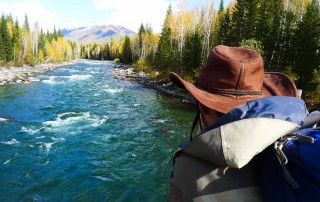Traveling to Hemu, Northern Xinjiang
Hemu (禾木) is a village in the mountains of Altai, the area in the north of Xinjiang set between Kazakhstan, Mongolia and Russia. The valley where the village rises is crossed by the river Hemu, which is not far from where it mixes waters with the river Kanas.
The inhabitants of Hemu are of Kazakh and Tuwa Mongol ethnicity. It is said that the latter may be direct descendants from the troops of Genghis Khan, who passed through these parts during the conquest campaign of the Middle Kingdom. If you’d like to learn about the “Chinese cowboys”, this is the place to go!

I arrived there after an epic journey. It started with a train ride from Kashgar to Urumqi (22 hours and 37 minutes, including a chess tournament with two police officers who were escorting a prisoner), in Urumqi I ran together with a crowd from the train station to the bus to catch the night bus to Burjin, then I spent a night in Burjin from where I took another bus to Hemu, in the heart of the Altai Mountains.
Despite having spent one of the worst nights of my life in Hemu (due to food poisining) the Altai Mountains offer exceptional landscapes and, if you’re planning a trip to Xinjiang, is certainly worth the effort to go as far as here.
What’s there to see in the Altai Mountains?
Hemu is part of the Kanas National Nature Reserve. Considering the difficulty and time necessary to get there, this is a destination I recommend only to those who love nature (mountains, forests, rivers, lakes), photography and trekking.
Since winters are rather rough – where “rough” is a euphemism for ridiculously inhospitable, – the Kanas and Hemu region is open to tourists only from June to October. The best times to visit are June – when the trees are blooming and the grass is still luxuriant – and September, when the leaves are about to fall and the valleys are tinted orange (I took the pictures in this article in late September).
How to get to Hemu
By land
The starting point for the Altai Mountains is the capital of Xinjiang, Urumqi. Head for the bus station “Nianzigou Passenger Station” (located at number 51 Heilongjiang Road) and by a ticket to Burjin (布尔津, in Chinese). The ticket costs about 180 Yuan and the trip lasts about 9 hours (the seats recline so sleeping isn’t an impossible undertaking). From Burjin you can take a bus directly to Hemu (the trip lasts about 5 hours and the bus leaves from the same station as where the buses from Urumqi arrive).
Hotel
As far as hotels go, both in Hemu and Burjin forget about finding something on the more famous platforms such as Booking or Agoda. In my case in Burjin my (ex) girlfriend booked us through a non-specific Chinese website while in Hemu we improvised and, since it was already fully booked, we ended up sleeping in a slum. However, I saw that on cTrip you can find various hotels so, if you’re thinking about booking in advance, I recommend you do it there.
By air
If you don’t want to spend a night on a bus, you can always take a plane from Urumqi to Burjin (Burjin’s airport is called Kanasi Airport, KJI). To book a flight I recommend cTrip. The cost of the ticket is about 1,500-1,700 Yuan, one way.
What should you bring?
Despite the red-hot summers of Xinjiang, at night it gets cold, especially if you head north. Bring a winter jacket! Other than that, expect to walk a good bit so don’t show up in ballerina slippers or high heels.
Also, both restaurants and grocery stores that you’ll find in the Altai Mountains have prices much higher than those in the rest of China. Loading up on supplies in Urumqi wouldn’t be a bad idea.
Looking for more travel tips? Check out our previous blog articles about Yunnan’s Forgotten Nakhi Kingdom, Rediscovered and Top 5 Places to Visit in Mainland China
Already got the travel bug, but want more than just a package tour and a picture at the Great Wall? Then you should consider applying for one of our award-winning programs in China; learn Mandarin in our Intensive Chinese Program, do an internship or volunteer!
About the author
Furio is an entrepreneur, speaker of many languages and founder of Sapore di Cina, a website that focuses on traveling and living in China.